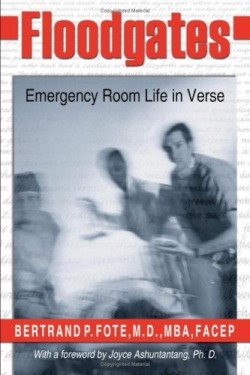Floodgates
Emergency Room Life in Verse
Hearkening back to the ancient practice of traditional African doctors who employed poetic incantations in their healing rites and rituals the poetry of Dr. Bertrand P. Fote an emergency room physician gives expression to the workings of his mind and heart as he treats trauma victims and the desperately ill sometimes winning and sometimes losing the battle with death.
Dr. Fote is a board certified emergency physician practicing in North Carolina and a Fellow of the American College of Emergency Physicians. Born in Cameroon he moved to the United States at the age of seventeen and earned his MD from Howard University in Washington DC. Called to be a healer his daily work makes him witness to human suffering; having also the mind and heart of a poet he is compelled to write about it. His poetry and journal entries tell readers what he has seen and felt and brief quotations from the Bible place them in the larger context of the need to find meaning in human suffering.
Few are privy to the inner thoughts of an ER doctor fighting for patients’ lives; in the moment all is intense focused effort: “The great floodgates opened / And they came in pouring / Like wildfire on dry grass” (“Floodgates”) and “Primary survey please / Airway controlled fast / As there’s no time for theories / Breathing assured with machines / Fluids circulate in through IVs / Disabilities noted really fast” (“Trauma: Life in the ER”). At other times he muses over the fragility of human life and the senseless acts that result in its loss: a young girl jumps from a moving car during an argument with her boyfriend and is killed; a woman who has just bought herself doughnuts and coffee is run down in the parking lot by a careless driver; a two-year-old boy wanders off while visiting his grandparents and drowns in their pool. These cause him great anguish and poetry becomes a way to express what prose can not.
Readers are offered a glimpse into the pride a doctor can take in his ability but also into the fact that he can be made anxious and humbled by the possibility of a simple error that could give death the upper hand. Dr. Fote also shows understanding of what a patient might feel when illness takes away his control over life: “He lies there / Trapped on his bed / Like Daniel once stood / In the ferocious lion’s den / Helpless like a child / Counting on humanity’s kindness” (“ICU: Intensive Care Unit or I See U?”).
The poetry in this volume is intimate intense and revealing. It is not particularly even in quality nor is it free of unfortunate errors such as the term “eptopic” pregnancy when “ectopic” is intended. It is best to enter this work having read the explanation of the African healing tradition thoughtfully provided in a foreword by Joyce Ashuntantang PhD; one will then read it not looking so much for adherence to poetic form and structure as for its power as incantation against an all-too-frequently victorious foe.
Reviewed by
Kristine Morris
Disclosure: This article is not an endorsement, but a review. The publisher of this book provided free copies of the book and paid a small fee to have their book reviewed by a professional reviewer. Foreword Reviews and Clarion Reviews make no guarantee that the publisher will receive a positive review. Foreword Magazine, Inc. is disclosing this in accordance with the Federal Trade Commission’s 16 CFR, Part 255.

